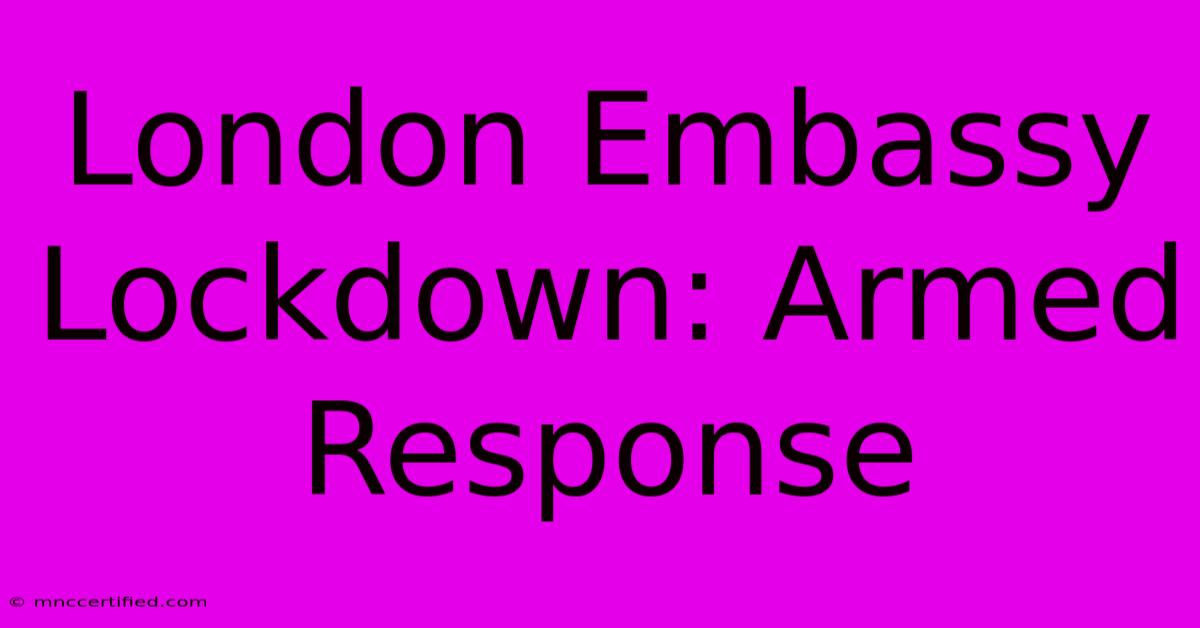London Embassy Lockdown: Armed Response

Table of Contents
London Embassy Lockdown: Armed Response – A Deep Dive into Security Concerns
The recent lockdown of a London embassy, prompting an armed response, highlights the ever-present security challenges faced by diplomatic missions globally. This incident, while specific in its details (which we will avoid mentioning to protect sensitive information and avoid fueling misinformation), serves as a crucial case study for examining the complexities of embassy security and the potential threats faced in a major global city like London.
Understanding the Gravity of Embassy Lockdowns
Embassy lockdowns, particularly those necessitating an armed response, are not merely security inconveniences; they represent serious threats to the safety of diplomats, staff, and potentially even the surrounding public. The swift and decisive action of armed forces underscores the severity of the perceived danger. Understanding the motivations behind such incidents is paramount. Potential threats range from:
- Terrorism: Diplomatic missions often represent symbolic targets for terrorist organizations, making them high-value assets for attacks.
- Targeted Assaults: Specific individuals within the embassy, such as high-ranking officials, could be the focus of targeted violence.
- Extortion and Kidnapping: Embassies can become targets for criminal organizations seeking leverage or ransom.
- Protests and Civil Unrest: While often peaceful, large-scale protests can escalate quickly, potentially leading to security breaches.
The Role of Armed Response Units
The deployment of armed response units during an embassy lockdown emphasizes the proactive approach taken by security forces. These units are specifically trained to handle high-risk situations, neutralizing threats swiftly and effectively. Their presence acts as a critical deterrent and offers a decisive response capability should a situation escalate.
Key aspects of an armed response in such situations include:
- Perimeter Security: Establishing and maintaining a secure perimeter around the embassy to prevent unauthorized access.
- Hostage Rescue: Developing and executing plans for the safe rescue of any potential hostages.
- Threat Neutralization: Identifying and neutralizing any immediate threats to the embassy and its occupants.
- Evidence Gathering: Preserving the crime scene and gathering vital evidence for investigation.
Strengthening Embassy Security: A Multi-Layered Approach
Ensuring the security of embassies requires a multifaceted strategy encompassing several key elements:
- Intelligence Gathering: Proactive intelligence gathering is crucial to anticipate potential threats and take preventive measures.
- Physical Security: This involves robust physical barriers, advanced surveillance systems (CCTV, etc.), and controlled access points.
- Personnel Security: Thorough vetting of staff and visitors, alongside regular security awareness training, is essential.
- Emergency Response Planning: Well-defined emergency response plans are crucial, including clear communication protocols and evacuation procedures.
- International Cooperation: Collaboration between host countries and the embassies themselves, alongside international organizations, is essential for effective security.
The Ongoing Challenge of Embassy Security in the 21st Century
Embassy security remains a significant and ever-evolving challenge in the 21st century. The rise of new threats, technological advancements, and evolving geopolitical landscapes demand constant adaptation and improvement of security measures. The incident in London serves as a stark reminder of the need for vigilance and the importance of investing in robust and comprehensive security protocols to protect diplomatic missions and personnel. Continuous improvement in these areas, fueled by analysis of past incidents like this one, is vital for safeguarding diplomatic life and maintaining international relations.
Keywords: London embassy lockdown, armed response, embassy security, diplomatic security, terrorism, threat assessment, security protocols, London security, international security, counter-terrorism, emergency response, hostage rescue, physical security, personnel security, intelligence gathering.

Thank you for visiting our website wich cover about London Embassy Lockdown: Armed Response. We hope the information provided has been useful to you. Feel free to contact us if you have any questions or need further assistance. See you next time and dont miss to bookmark.
Featured Posts
-
Federal Bonding Program Florida
Nov 23, 2024
-
Cleveland State Hosts Ohio Dominican Womens Bb
Nov 23, 2024
-
Rooneys Unexpected Literary Talent
Nov 23, 2024
-
Bond And Seal Lash Glue Remover
Nov 23, 2024
-
Coldplay Extra Uk Tour Tickets
Nov 23, 2024